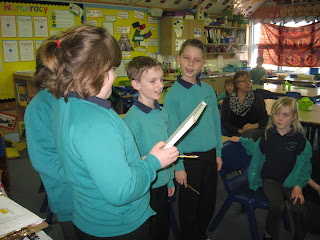Click on this link for the Christmas Ornaments maths problem.
Mathematics at BSM
| Maths At BSM At Blandford St Mary Primary School there is a daily mathematics lesson in each class lasting up to one hour depending on the age group. The lesson addresses the requirements of the National Curriculum for Mathematics. The key features of a lesson include: · Interactive whole class/group teaching – using AfL techniques set out in the Teaching & Learning policy · The use of mental methods leading to effective use of written methods · Development of the children’s mathematical vocabulary · An effective pace · Manageable and effective differentiation On the tabs above are links to: skills pyramids outlining objectives and methods relating to different year groups for addition, subtraction, multiplication and division. As well as resources in many other areas. |
Tuesday, December 10, 2013
Tuesday, November 12, 2013
Maths Transition Activities
Blandford St Mary Primary has been establishing stronger links with the secondary school, The Blandford School. Together we have developed and carried out shape activities such as the example above where Year 6 children carefully drew shapes using angle measures and compasses. They gained a deep understanding of the properties of regular polygons and tessellation.
More fun activities are being developed for this year.
More fun activities are being developed for this year.
Monday, May 20, 2013
Home Learning Survey
Pupils of Blandford St Mary Primary School,
We are looking at how
to develop home learning and need to know what you think. Please click on the link below and complete the survey. Any information that you give will be treated
confidentially.
Monday, March 4, 2013
Mathematics INSET
Thank you to all the staff at Blandford St Mary for making the February INSET on mathematics a great success. Teachers and teaching assistants used Haylock and Cockburn's connective model to identify effective teaching of mathematices (see below). Staff were introduced to new intervention strategies to be used in the classroom (remember there are resources on the intervention documents page) and we also looked at mathematics games (links are on the games page).
Wednesday, February 13, 2013
Maths and Enterprise Week
Many cross curricular links were made last week as part of Enterprise Week, especially with mathematics. For example, Year R, 3 and 5 made some wonderful food, such as chocolate truffles and jam, and used their measuring skills. Year 4 learnt about fairtrade products and used compass directions to find routes on a world map. Year 6 used their understanding of nets to make 3D shapes, resulting in some wonderful trinket boxes.
All of the classes carried out some excellent market research and used their data handling skills. The activities showed how mathematics is an important part of everyday day and the children enjoyed using and applying their skills and understanding. The money raised will be donated to Comic Relief. Well done to everyone!
 Year 4 market research
Year 4 market research
 Year 6 designing a net
Year 6 designing a net
All of the classes carried out some excellent market research and used their data handling skills. The activities showed how mathematics is an important part of everyday day and the children enjoyed using and applying their skills and understanding. The money raised will be donated to Comic Relief. Well done to everyone!
 Year 4 market research
Year 4 market research Year 6 designing a net
Year 6 designing a netWednesday, January 30, 2013
Dancing Problems?
How many people were at the dance?
When they danced as couples one person was left over.
When they danced in threes one person was left over.
When they danced in fours one person was left over.
When they danced in fives one person was left over.

When they danced as couples one person was left over.
When they danced in threes one person was left over.
When they danced in fours one person was left over.
When they danced in fives one person was left over.
Monday, January 7, 2013
Researching Mathematics Provision
Recently children and teaching staff have used a research process known as the Nominal Group Technique to help identify how to children could do even better at maths. As part of the research the the participants thought how children could improve at maths and then voted for the ideas that they thought were the most important. The results were enlightening and have been used to target additional support.
Subscribe to:
Comments (Atom)


